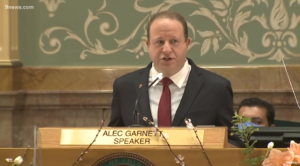
By Dave Workman
Editor-in-Chief
Colorado gun rights have taken a leap backward as Democrat Gov. Jared Polis signed legislation gutting the Centennial State’s long-standing firearms preemption law, thus allowing local municipalities to establish their own gun control laws.
Anti-gunners celebrated, but rights activists have a far different perspective.
The new statute returns Colorado to a checkerboard situation where neighboring jurisdictions might have different, perhaps conflicting gun laws that confuse, and according to some critics, possibly even ensnare gun owners into situations where they might be violating a local law by crossing an invisible jurisdictional line.
At the same time, Gov. Polis signed another measure establishing an “Office of Gun Violence Prevention,” whose job will be to coordinate and promote efforts to reduce “gun violence.” The bill provides $3 million in funding for this new office.
According to the Denver Post, Senate Bill 21-256 “reverses a ban that keeps local governments (towns, cities and counties) from creating their own gun regulations.
“But local jurisdictions can only make ordinances that are stricter, not more lenient, than state law,” the newspaper explained. “Any regulations currently in place that are less restrictive are effectively overturned. A person can only face a criminal penalty for violating local laws if they knew about them or reasonably should have known. The new law also puts concealed-carry requirements back in the hands of the state so they’re consistent, but it does allow local governments to decide where those guns can be carried.”
The Wall Street Journal quoted Boulder Mayor Sam Weaver asserting, “In theory, if we didn’t have this law, you could go buy an assault weapon, and then walk across the street and shoot a bunch of students.”
Weaver’s statement would be open for much debate, since there is already a law against shooting people, whether with a firearm meeting the description of an “assault weapon” or some other gun.
The Colorado reversal sets a bad precedent that gun prohibition groups in other states would like to follow. Since preemption statutes became popular nearly 40 years ago, anti-gunners have been crusading against preemption statutes because they placed a roadblock to the imposition of local gun control laws.
Dozens of states adopted these preemption laws, which brought uniformity to gun laws in each state from border to border. For example, Washington State was one of the earliest to adopt the law, first in 1983 and amending and strengthening it in 1985, the year the National Rifle Association held its annual members meeting and exhibits in Seattle. Henceforth, what was legal in the coastal city of Aberdeen was also the law in Spokane, near the Idaho border more than 350 miles away. For the past several years, state lawmakers from the increasingly liberal Seattle area have been attempting to repeal the law with backing from the Seattle-based and billionaire-supported Alliance for Gun Responsibility.
In Colorado, the preemption law overruled an attempt by the Boulder City Council to ban so-called “assault weapons” in the city earlier this year, and only days later, a man who bought a gun in another city opened fire at a Boulder market killing several people including a police officer.
As for the Office of Gun Violence Prevention, it’s not entirely clear how the agency will prevent violent crime.



